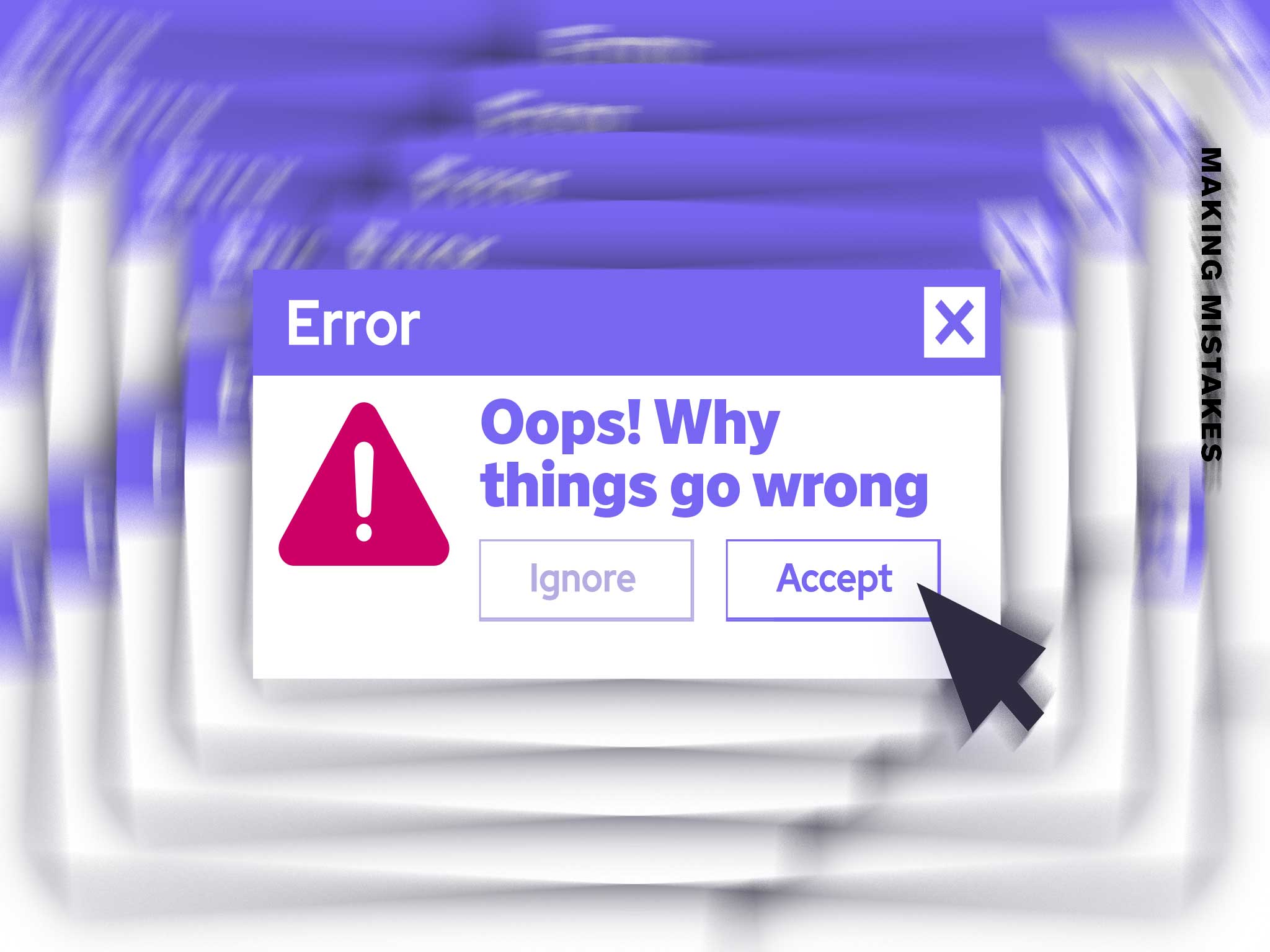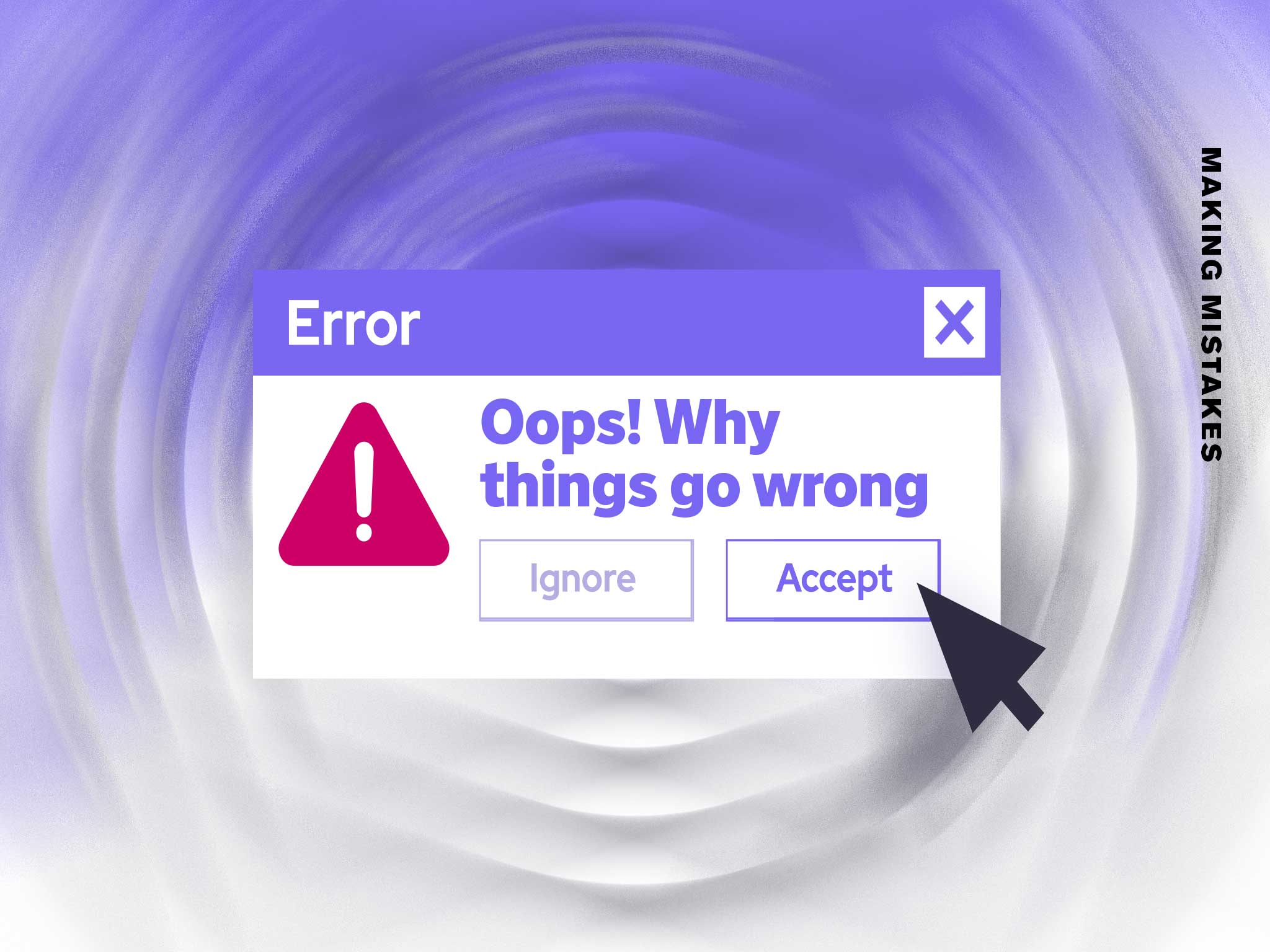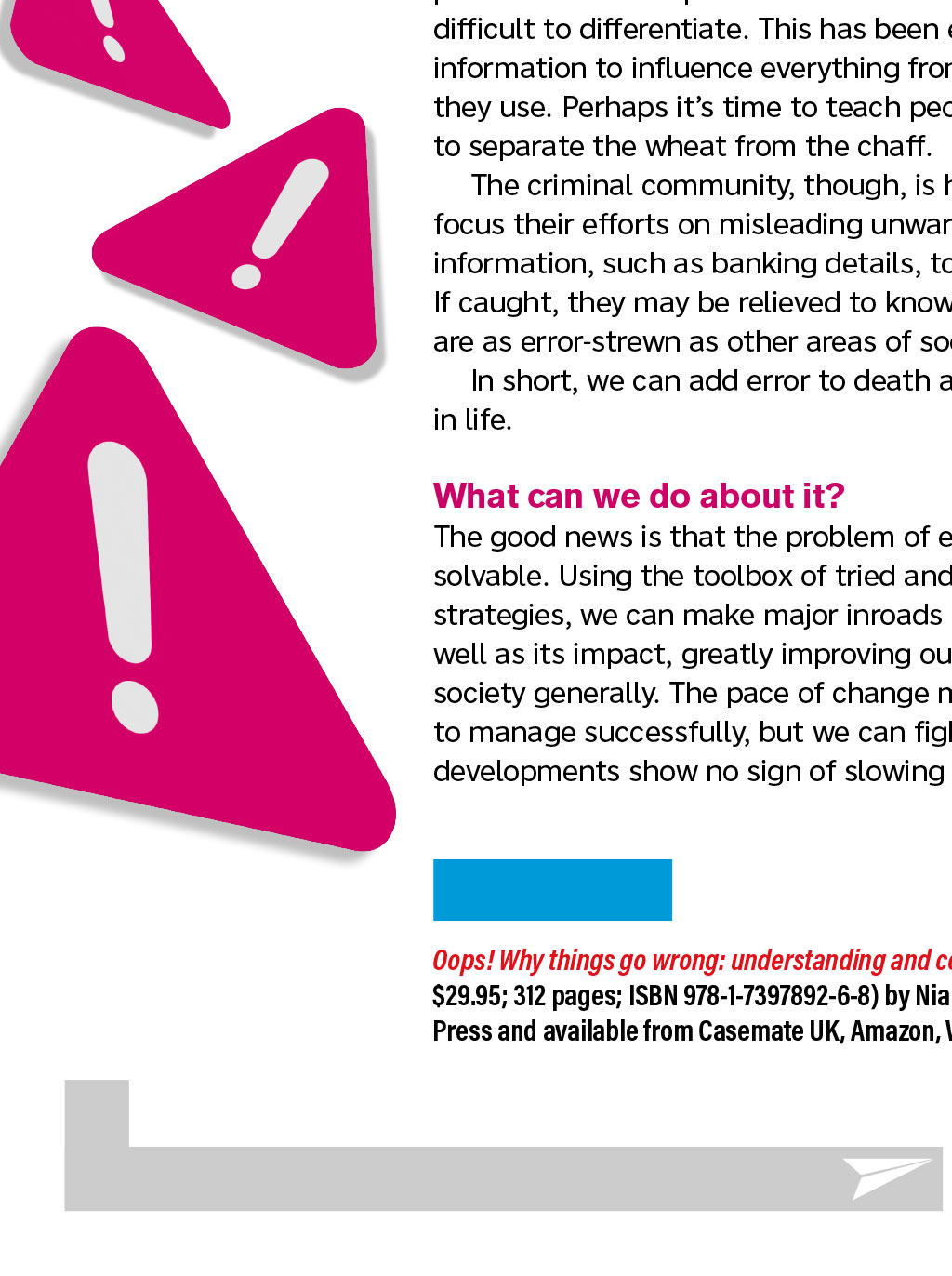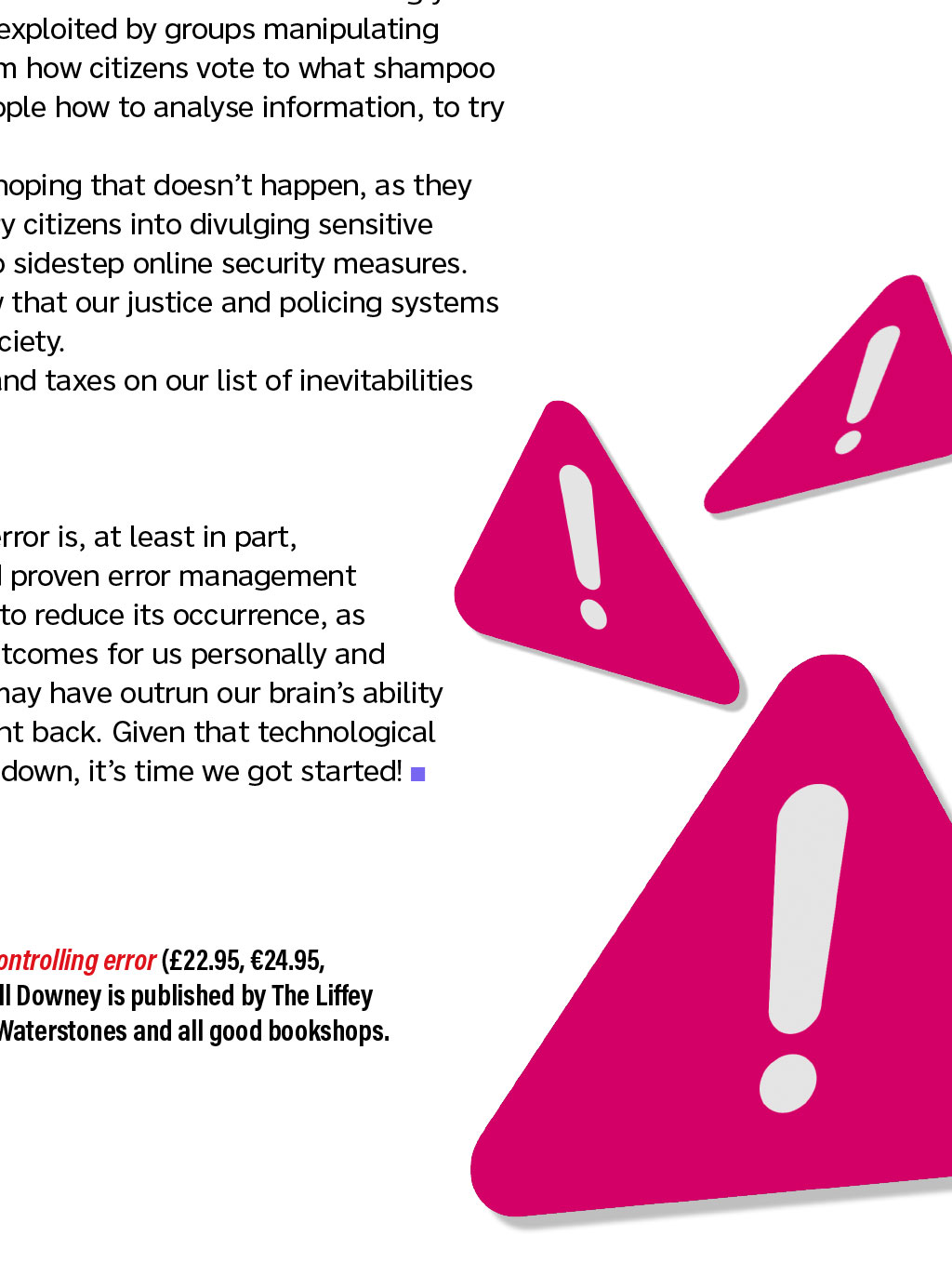






























Embracing imperfection: the impact of error on industry and society and what we can do about it By Niall Downey, FRCSI/Aer Lingus Our heavily curated Instagram society has become very intolerant of error. In an era when everything we present is airbrushed, tweaked, filtered and polished before being released into the wild, we labour under the misapprehension that the real world is similar. We are sadly mistaken. The real world is messy, imperfect and error-prone. My book, Oops! Why things go wrong, explores why error is inevitable, how it affects many different industries and areas of society, how it is sometimes quite efficient from a physiological standpoint, and, most importantly, what we can do about it. Its not your fault Societys development has accelerated at warp speed in recent decades and shows no signs of slowing down. Unfortunately, our brains have had trouble keeping up and are trying to function in a highly complex, rapidly changing environment while still running on caveman software! This dichotomy is the essence of what I explore in my book. The mismatch between the fast-paced environment and our inability to respond appropriately results, inevitably, in errors occurring. This is merely an inconvenience in many areas, but in safety critical industries such as aviation and healthcare it can literally mean life or death. Unfortunately, society is also very intolerant of error, especially in others! We need to change this mindset. Error is nothing to be ashamed of. The only way to even come close to avoiding error is to be so cautious and risk averse that we stifle innovation and, in healthcare, avoid intervention in none but the easiest of cases. Your good health I was sitting at the nurses station on a ward in a major Belfast hospital. The bed closest to me had the curtains pulled. The crash team had just left and behind the curtains was an elderly lady who had just died from irrecoverable cardiac failure, precipitated by me prescribing her more intravenous fluids than her ailing heart was apparently able to handle. I had just killed my first patient! My training as a doctor focused primarily on not making mistakes. They were considered unacceptable and something not to be discussed, especially if you hoped to progress up the career ladder. Sticking our heads in the sand is not the answer, however. In developed countries, for example, it is estimated that around 10% of hospital admissions suffer an adverse event, with around 5% of these causing or contributing to their death. Error is estimated to cost about 10% of a countrys healthcare budget, despite up to 70% being considered preventable. In the UK alone, thats more than 15bn! When I jumped ship to retrain as an airline pilot, I was somewhat disorientated by a completely different approach to error. It was seen as inevitable and, therefore, something to be dealt with, not to be ashamed of. It took me quite a while to come to terms with this mentality, but, over time, I realised what a valuable approach it was. Again, the statistics are clear: total deaths, globally, in commercial jet aviation in 1977 numbered around 3,000 people, while current figures are less than 1,000 annually, despite an almost 10-fold increase in passenger numbers. Indeed, in 2017, the number of deaths globally was zero. This is largely because of our focus on human factors since the late 70s. So 12 years ago, I started to convey the lessons from aviation to a healthcare audience, with limited success. Recently, however, the mindset seems to have changed. Staff appear more accepting of the inevitability of errors, regardless of how hard they work. Patients, too, no longer expect their doctors to be perfect but when mistakes do occur, most want truthfulness, an apology, and signs that steps are being taken to avoid a recurrence. Healthcare administrators also need to play their part as, currently, a defensive stance means patients have no alternative but to lodge a complaint or even instigate legal action in order to get answers, which generally leads to a suboptimal outcome for all involved. What about aviation? I regularly get told by healthcare staff that the idea of learning from aviation has been overplayed and that there is very little overlap usually by people who have never sat in the flight deck of a passenger jet and have no idea what the role of the captain is in our industry. Having worked in both, I have to disagree. They are very different industries, but both involve humans interacting with a complex, fast-changing and high-risk environment. By their very nature, both will be prone to error. The difference, however, is in how they deal with this. In too many cases, healthcare still practises a name, blame, shame, retrain policy, whereas aviations Safety Management System approach involves a just culture, systems thinking and our crew resource management philosophy. Our approach, driven by the colossal loss of life in the 1977 Tenerife disaster, has been spectacularly successful. I believe the principles are translatable to healthcare, but by genetically engineering it in not, as previously, by transplant, the poor tissue match leading to rejection, whereas the underlying DNA is compatible. We can give healthcare staff our framework, but it will be up to them how they modify it and apply it to their environment. This will vary from unit to unit, but the framework is sound. Problem detected. Much of what needs to change in healthcare is systemic. We need more staff, better IT facilities, better administrative support to free up mental bandwidth to focus on what staff should really be doing, and a focus on staffs basic physiological needs such as hydration, nutrition, dedicated break areas, and a workload that enables them to avail of all this. We also need a stimulus for change. A series of preventable accidents in the 1970s, culminating in Tenerife, prompted the change that resulted in the widespread acceptance of human factors (HF) in aviation. Healthcare seems to calmly sail past disasters such as the Mid-Staffordshire events, which prompted three reports by Sir Robert Francis QC recommending a HF-type approach. Others include the Bristol Babies scandal, Morecombe Bay, Northern Irelands hyponatraemia scandal, which prompted an inquiry that took 14 years to complete, and others none of which seem to have been enough to prompt a sea-change in thinking in the way disasters in other safety-critical industries did. What will be healthcares Tenerife moment? There are pockets of great work out there, driven by enthusiastic individuals such as Professor Peter Brennan. He has driven many improvements with a HF agenda and is pushing for change from within as a Council Member of the Royal College of Surgeons in London. Other groups, notably anaesthetists, have adopted many of the HF messages and have been applying them long before they became trendy. Just to reiterate, research shows that error is eating up 10% of healthcare budgets in many countries, despite similar research showing that 70% of issues could be caught using our aviation-style techniques. In the UK, those losses amount to more than 20bn (around 1% of gross domestic product), meaning savings could be as much as 15bn. Given healthcares focus on evidence-based practice, surely that should be incentive enough? What about everyone else? Other industries are by no means immune to error. Agriculture, for instance, has the highest mortality rate among workers in the UK and Ireland. UK figures show deaths consistently running at 20-times higher than other industry averages. Errors in the financial industry led to a global meltdown of financial markets in 2008, the effects of which are still being felt. Error has even become a commodity in recent times. Fake-news sites have proliferated to the point where fact and fiction have become increasingly difficult to differentiate. This has been exploited by groups manipulating information to influence everything from how citizens vote to what shampoo they use. Perhaps its time to teach people how to analyse information, to try to separate the wheat from the chaff. The criminal community, though, is hoping that doesnt happen, as they focus their efforts on misleading unwary citizens into divulging sensitive information, such as banking details, to sidestep online security measures. If caught, they may be relieved to know that our justice and policing systems are as error-strewn as other areas of society. In short, we can add error to death and taxes on our list of inevitabilities in life. What can we do about it? The good news is that the problem of error is, at least in part, solvable. Using the toolbox of tried and proven error management strategies, we can make major inroads to reduce its occurrence, as well as its impact, greatly improving outcomes for us personally and society generally. The pace of change may have outrun our brains ability to manage successfully, but we can fight back. Given that technological developments show no sign of slowing down, its time we got started! Oops! Why things go wrong: understanding and controlling error (22.95, 24.95, $29.95; 312 pages; ISBN 978-1-7397892-6-8) by Niall Downey is published by The Liffey Press and available from Casemate UK, Amazon, Waterstones and all good bookshops. MAKING MISTAKES